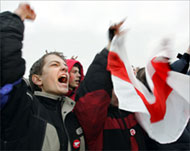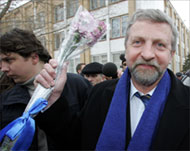Belarussians vote for president
Belarussians are voting in presidential elections on Sunday, shadowed by fears of confrontation between followers of Alexander Lukashenko, the hard-line incumbent, and beleaguered opponents pushing for change.

After a campaign marred by arrests, harassment and terror plot accusations, the opposition’s plans to protest after polls close could set them on a collision course with state authorities, who have banned rallies on election day.
With mass protests having helped bring opposition leaders to power in three former Soviet republics after disputed elections, Belarus could be the latest country on Russia’s periphery to be convulsed by protests and the threat of a forceful state response, experts said.
Underlying the election has been a struggle for regional influence between Russia and the West, which is seen by Lukashenko’s government and Moscow as a major culprit in the political upheaval in Ukraine, Georgia and Kyrgyzstan. Lukashenko accuses the West of plotting a repeat here.
Initial exit poll results, released two hours into the voting by two groups that critics say are loyal to Lukashenko, gave him more than 80%. The figure was certain to fuel opposition claims of fraud.
Lidiya Yermoshina, the Central Elections Commission head, announced that less than 40% of the seven million eligible voters had cast ballots – including about 30% who voted last week in early balloting.
Commission line
|
“We in Belarus are conducting the election for ourselves…as for sweeping accusations, I’ve been hearing them for 10 years. I’ve already gotten used to them” Alexander Lukashenko, Belarussian president |
Yermoshina said voters were resisting “alien influence” seeking “to hinder our election process.”
But comments favouring Lukashenko by polling groups and even the Election commission so early into the balloting may inflame the opposition.
Western countries themselves have forged close ties with opposition groups and made no secret of their contempt for the ruler of what Washington calls an outpost of tyranny in Europe. It has condemned the campaign as “seriously flawed and tainted.”
After casting his vote at a sports facility in Minsk, Lukashenko dismissed international criticism of the election. “We in Belarus are conducting the election for ourselves … What is important is that elections take place in accordance with Belarussian legislation.”
“As for sweeping accusations, I’ve been hearing them for 10 years. I’ve already gotten used to them,” he said.
Strong man
 |
|
Members of the opposition parties |
Since his first election in 1994, Lukashenko has silenced foes and maintained his grip on power through votes dismissed as illegitimate by the opposition and Western governments. Four opponents disappeared in 1999-2000.
While he is a dictator to his opponents and foreign critics, many Belarussians see the 51-year-old former collective farm manager as having brought stability after the uncertainty that followed the 1991 Soviet collapse.
“He gives us work and a salary,” said Igor Nisakov, 52, a plumber who voted for Lukashenko.
Even independent polls suggest Lukashenko, who has pushed through a referendum scrapping term limits and hinted he plans to stay in office indefinitely, could win a majority of the vote, avoiding a runoff.
Opposition call
 |
|
Alexander Milinkevich is |
Milinkevich has called on Belarussians to gather on Oktybrskaya Square in central Minsk after polls close, but he has suggested demonstrators would not try to force their way onto the square if it is heavily guarded by police and would gather elsewhere.
“It will be a peaceful demonstration. We will come out with flowers,” Milinkevich said after casting his ballot at a Minsk school. “We will tell people the truth.”
The state has mounted a campaign of threats and allegations of violent, foreign-backed overthrow plots that its opponents say is aimed at frightening people off the streets and justifying the potential use of force against protesters. Security was tightened Sunday near the square, with streets blocked to traffic.
The United States and European Union have called on both sides to avoid violence.
A 58-year-old former physicist, Milinkevich says he aims to show that change is possible.